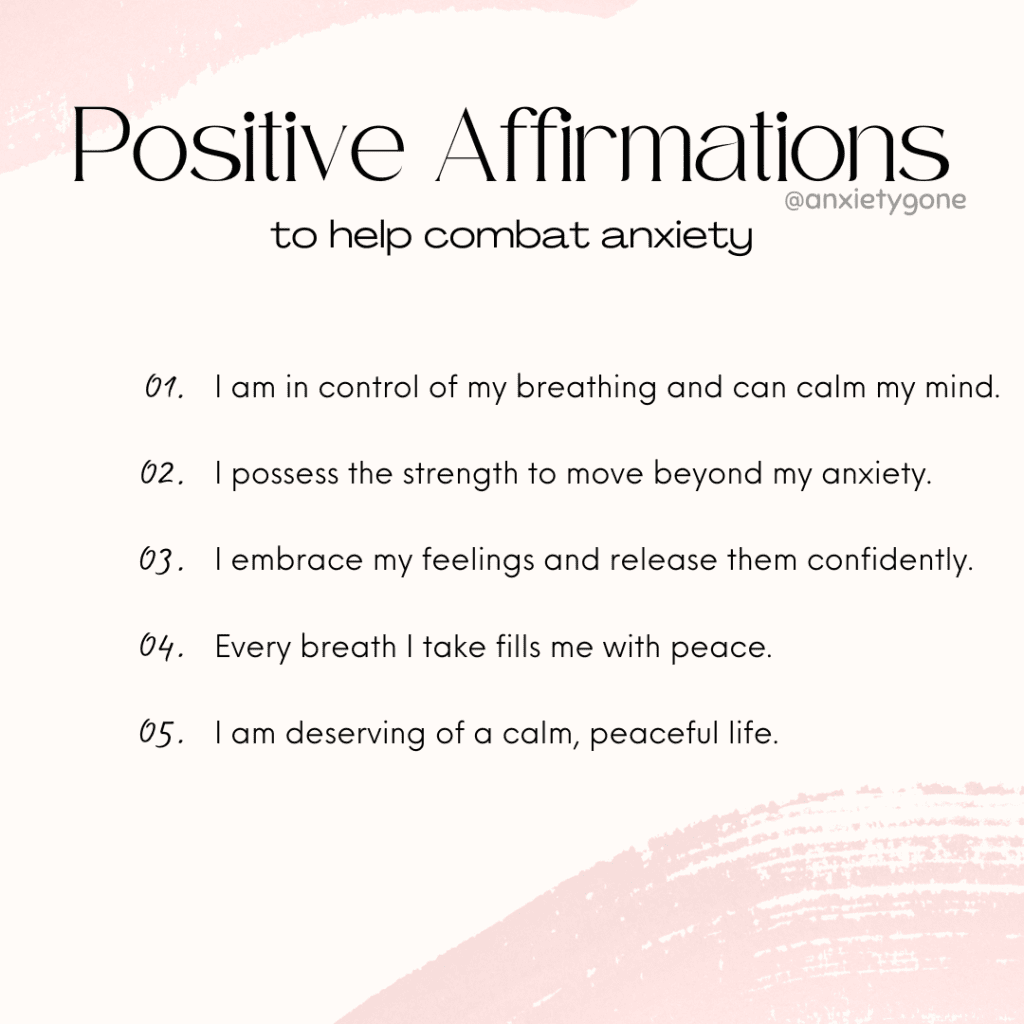Full Disclosure: Clicking on these links could mean a tiny commission for me, at no extra cost to you.
Using positive affirmations is a powerful technique to strengthen mental resilience and combat the negative thinking patterns that often accompany anxiety. Affirmations are positive, empowering statements that, when repeated regularly, can influence your subconscious mind, helping to reshape your thoughts and diminish the frequency and intensity of anxious feelings.
The Power of Positive Thinking: Understanding Daily Affirmations
Daily affirmations are positive statements that, when repeated regularly, can influence the subconscious mind to adopt a more positive perspective. The idea is based on the principle (and science) that repeated exposure to positive words and thoughts can lead to a change in how we perceive ourselves and our surroundings. This mental shift can be particularly beneficial for individuals struggling with anxiety, as it helps replace negative thought patterns with encouraging and supportive ones.
Why Affirmations Work: The Science Behind the Practice
The effectiveness of daily affirmations is supported by various psychological theories, including cognitive behavioral therapy (CBT) and neuroplasticity. CBT suggests that changing negative thoughts can lead to changes in feelings and behaviors, while neuroplasticity refers to the brain’s ability to reorganize itself by forming new neural connections in response to learning or experience. Affirmations help to cultivate a positive thinking framework, encouraging the brain to embrace and act on these new, positive thoughts.
9 Benefits of Positive Affirmations
Affirmations can be quite beneficial for mental health in several ways. Here’s how they might help:
1. Counteracts Negative Thoughts
Positive affirmations are a great tool to counterbalance the negative and often irrational thoughts that can trigger anxiety. By affirming your worth, capabilities, or calmness, you can challenge and weaken the prevalence of self-doubting or critical thoughts.
Download our digital workbook “Overcoming Overthinking” here to start working through those negative thoughts.
2. Boosts Self-Esteem
Regularly affirming your strengths and values can help build self-esteem and confidence, which are often eroded by anxiety. This enhanced self-esteem supports a more positive mental outlook and decreased vulnerability to anxiety.
3. Encourages Positive Thinking
Affirmations can help shift your focus from a mindset of lack or fear to one of strength and possibility. This shift can reduce the stress response associated with anxiety and encourage a more balanced emotional state.
4. Promotes Behavioral Changes
By changing your thought patterns, affirmations can lead to positive changes in your behavior. For example, affirming your ability to handle challenges can make you more likely to engage in activities you might typically avoid due to anxiety.
5. Boosting Self-esteem
Regular affirmations can reinforce a positive self-image and help you focus on your strengths rather than weaknesses. This can lead to increased self-confidence.
6. Enhancing Motivation
Affirmations related to goals and aspirations, such as overcoming anxiety, can motivate you to take action. They serve as reminders of what you are capable of achieving, thus reinforcing the drive and determination needed to accomplish tasks.
7. Managing Stress and Anxiety
Positive affirmations can be a part of strategies to manage stress and anxiety. They can help you maintain a calm mindset in challenging situations, which is crucial for emotional regulation. For example, when you’re feeling anxious you can use calming affirmations to shift your mindset and retrain your brain.
8. Improving Problem-solving Skills
By fostering a positive mindset, affirmations can enhance one’s ability to approach problems more constructively. A positive attitude can enhance cognitive flexibility, making it easier to find solutions during difficult times.
9. Building Resilience
Regular use of positive affirmations can help build resilience by reinforcing mental endurance and a positive outlook, allowing you to better handle adversity.
How to Use Daily Affirmations in Your Routine
To harness the benefits of daily affirmations for anxiety relief, follow these practical steps:
- Choose Your Affirmations Wisely:
Select affirmations that resonate deeply with you and reflect your desired state or feelings. They should be in the present tense, positive, and specific. Examples include “I am calm and peaceful” or “I handle my anxiety with compassion.” - Make it a Daily Habit:
Consistency is key. Set aside a specific time each day, perhaps morning or night, to repeat your affirmations. This could be while you’re brushing your teeth, during meditation, or right before you start your day. - Use a Journal:
Write your affirmations down. This not only reinforces the message but also makes it more tangible. You might also reflect on any changes you notice or how you feel after repeating your affirmations. - Speak Them Aloud: Saying affirmations out loud can enhance their effectiveness by engaging more senses. The auditory processing of hearing your own voice affirming these positive thoughts can strengthen their impact.
Extra Tips For Using Affirmations
Here are some extra tips that will help you get the most out of your affirmations:
- Visualize Success: While reciting your affirmations, try to visualize yourself in a state where you have achieved what your affirmations promote. This visualization can increase the emotional impact of the affirmations, making them more powerful.
- Create Personalized Affirmations: The most effective affirmations are those that are personal and relevant to the specific fears and challenges you face due to your anxiety. For instance, if you often feel inadequate, an affirmation like “I am competent and skilled” can be uplifting.
- Use the Present Tense: Affirmations are most effective when phrased in the present tense, as this helps you to subconsciously accept them as current reality. For example, saying “I am calm and centered” is more impactful than “I will be calm and centered.”
- Keep Them Positive: Ensure that affirmations are phrased positively, as the subconscious mind can sometimes ignore negations such as “not” or “don’t.” Focus on what you want to feel or achieve, rather than what you wish to avoid or change.
- Combine with Visualization: Enhance the power of your affirmations by visualizing yourself as you embody these statements. This can deepen the impact of the affirmations by engaging more of your senses and emotions.
- Use Affirmation Cards: If you have a hard time coming up with affirmations for yourself, pick up a deck of affirmation cards. These take the stress out of trying to find the right words and they bring an extra dose of fun to the practice.
Examples of Effective Daily Affirmations for Anxiety
To get started, here are a few affirmations tailored to combat anxiety:
- “I am in control of my breathing and can calm my mind.”
- “I possess the strength to move beyond my anxiety.”
- “I embrace my feelings and release them confidently.”
- “Every breath I take fills me with peace.”
- “I am deserving of a calm, peaceful life.”
Integrating Affirmations with Other Mental Health Practices
While daily affirmations are powerful, they are most effective when used in conjunction with other mental health practices:
- Mindfulness Meditation: Combine affirmations with mindfulness meditation for deeper relaxation and focus.
- Therapy: Work with a therapist to uncover and address the roots of your anxiety.
- Physical Activity: Regular exercise can reduce anxiety and improve mood, enhancing the benefits of affirmations.
Conclusion
Daily affirmations offer a simple yet effective tool to help manage anxiety and improve overall mental well-being. By integrating affirmations into your daily routine, you actively reprogram your thought patterns towards more positive and empowering beliefs. This practice not only diminishes anxiety but also enhances your overall emotional resilience, enabling you to face life’s challenges with more confidence and peace.
FAQs About Daily Affirmations
- How long does it take to see results from daily affirmations?
Results can vary, but many people notice a shift in their mindset within a few weeks of consistent practice. - Can affirmations cure anxiety?
While affirmations are a useful tool, they are not a cure. They should be used as part of a comprehensive approach to anxiety management. - Do I need to believe in the affirmations for them to work?
Belief in the process can enhance its effectiveness, but even if you start with doubts, the repetition itself can start to shift your mindset over time.











